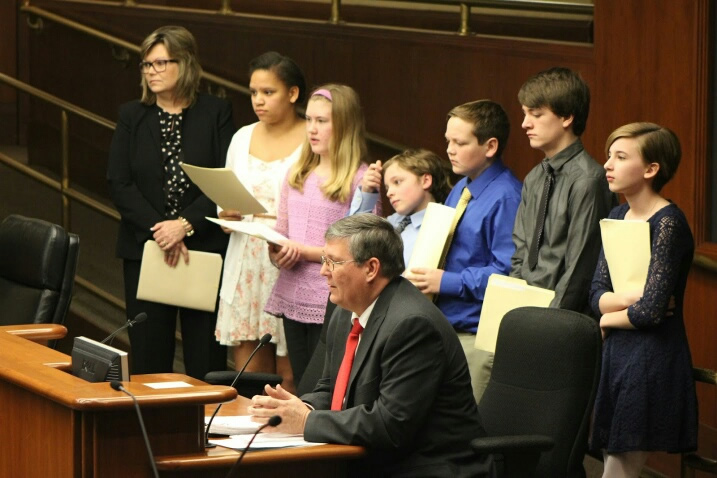

Share
With the stroke of a pen, Governor Mark Dayton made a long overdue acknowledgement and fulfilled the dream of 90 Owatonna sixth graders. After more than a century, the workers who built the Minnesota State Capitol will finally be recognized in the building they erected.
Dayton signed a bill June 1 to authorize the installation of a plaque honoring the workers.
The legislation, passed as part of the Omnibus Supplemental Budget Bill, H.F. 2749, authorizes placing “a plaque or three-dimensional marker in the State Capitol building in a space easily visible to public visitors to recognize and honor the efforts and sacrifice of workers who constructed the State Capitol building, as well as those who worked on subsequent projects to preserve the building.”
Students in Jennifer Hansen’s three history classes at Owatonna Willow Creek Intermediate School came up with the idea for this recognition and mounted the campaign that made it a reality. Hansen and Cannon Falls teacher Missy Klapperich collaborated with Randy Croce, staff member at the University of Minnesota Labor Education Service, to design a curriculum about the statehouse workers, based on the documentary and website, Who Built Our Capitol? and funded by the Education Minnesota Foundation for Exellence in Teaching and Learning.
Hansen taught the set of lessons in 2015 and students were fascinated with the lives of the men and women who erected the Minnesota icon between 1896 and 1907. The pupils discovered that none of the workers’ names were included in the cornerstone nor visible anywhere else in the building.
Hansen recalled that, “It started an inquiry as to why aren’t these State Capitol workers recognized in the State Capitol and why is there no memorial to them in the building?”
Among the 90 history class students was Chloe Beede, who declared, “We could do something about that, so we decided to write people.” The group took it a step further, conducting a petition campaign that garnered over 700 signatures, which they forwarded to their state legislators. That got the attention of Senator Vicki Jensen, DFL-Owatonna, and Representative John Petersburg, R-Waseca, who both visited the school and sponsored companion bills.
The legislation did not pass in 2015, but was revived this year. When the bills came up for committee hearings, the legislators invited Hansen and students to testify, so three groups of six students each came to St. Paul.
In their testimony before the House and Senate committees, each of the students represented one of the workers who died during the statehouse construction. They told legislators the stories of Felix Arthur, John Biersack, Albert Swanson, Alfred Magnuson, Florian Zauner and John Corrigan, who were killed in accidents between 1898 and 1903. The young speakers emphasized that these workers in particular should be honored in the memorial.
Paul Mandell, executive secretary of the Capitol Area Architectural and Planning Board, which will supervise design and placement of the plaque, said lawmakers were impressed by the students’ actions.
“Several legislators told me that this was the most exciting presentation they’d seen all year. I was moved by those kids and their connection to what the Capitol means to people, especially how they represented the six people who died so emotively. It really struck me.”
In an uncommon display of bipartisanship, one Senate and two House committees passed the bill unanimously. The final legislation sets a Jan. 1, 2017, deadline for installation of the plaque to coincide with the projected completion of reconstruction work on the Capitol.
The legislation calls for “sixth graders from across the state to submit designs for the memorial plaque or marker.” The planning board will base the bronze memorial on the students’ submissions.
Mandell will be working with the Minnesota Board of Education to publicize the competition in late August and early September and solicit and review submissions from throughout Minnesota.
“It’s really a breath of fresh air to see sixth graders so invested in something like that,” said Mandell. “It gives me hope for the future.”

